The holidays always mark a homecoming in Tsavo, when many of our wild-living orphans return to the places where they grew up. They usually remain in the area for many weeks, happy to spend time with their human-elephant family. Oftentimes, they come with their own families in tow, and Ithumba and Voi are abuzz with tiny calves.
Saving a single elephant life today has implications for generations. We feel this poignantly this time of year, when we meet calves born to the orphans we rescued, raised, and reintegrated back into the wild. I am ever so grateful for your support, which makes these stories possible, and I wish you a safe, healthy, and very happy New Year.
– Angela Sheldrick
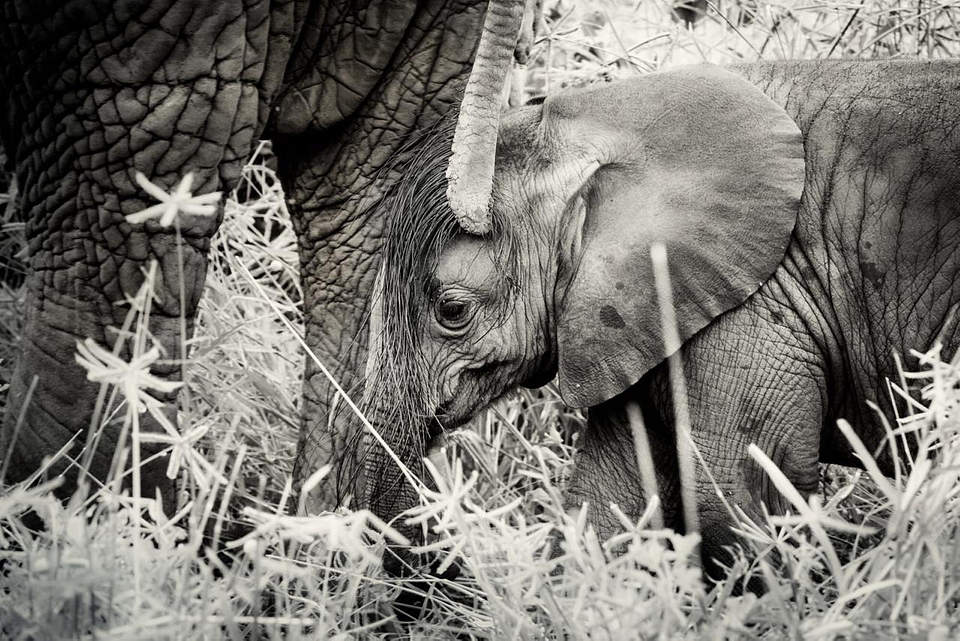
Home for the holidays
The holidays are always a special time of year. They are a time to be with those we hold dearest, to celebrate the blessings we share. Elephants are no different. While they chart their lives by the moon and seasons, unbound by the calendars that define human existence, they too seem to have an innate drive to return home for the holidays each year. When December rolls around, flush from recent rains, the first wild-living orphans begin to turn up at our stockades. As the month progresses, more and more continue to trickle in.
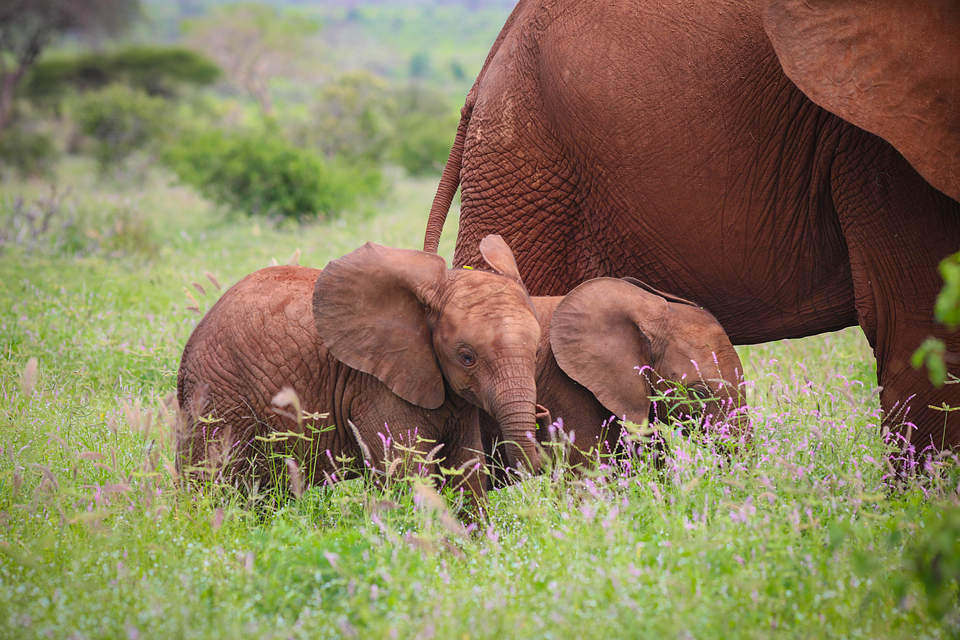
When we were first introduced to Eco and Mwitu last holiday season, they were newborns
Just as we come home bearing gifts, so do elephants. These come in the form of tiny miracles, their own wild-born babies. At the dawn of last year’s holiday season, Mweya and Edie showed up at Voi with their brand new calves tottering behind them. They had given birth several months prior, at the height of the dry season, when travelling back to Voi was impossible due to the lack of water en route. As soon as conditions allowed, however, they made a beeline for Voi, itching to celebrate their new babies — who we called Mwitu and Eco — with the people who raised them. Mweya and Edie’s ex orphan herd remained in the area through the New Year, clearly in no rush to wrap up the celebrations.
These moments unfold year after year in both Voi and Ithumba, and we have come to anticipate the holidays with great excitement. Blessedly, this festive season is panning out to be just as special as those past. It began in Voi, where Mweya and Edie’s herd appeared during the second weekend of December. We had not seen them for nearly a year, since their last holiday visit. Mwitu and Eco have flourished in the intervening months, growing into perfectly plump little specimens — and happier elephants you have never seen! Just a few weeks after their arrival, 19-year-old Ndara turned up with her no-longer-so-little boy, Neptune, by her side. We hadn't seen them for nearly two years and Neptune, who is approaching his fourth birthday, is turning into a handsome young bull. They are all unabashedly joyful elephants, throwing up greens in excitement or charging around out of sheer delight. Their mood is infectious, and everyone at Voi now has a special spring in their step.
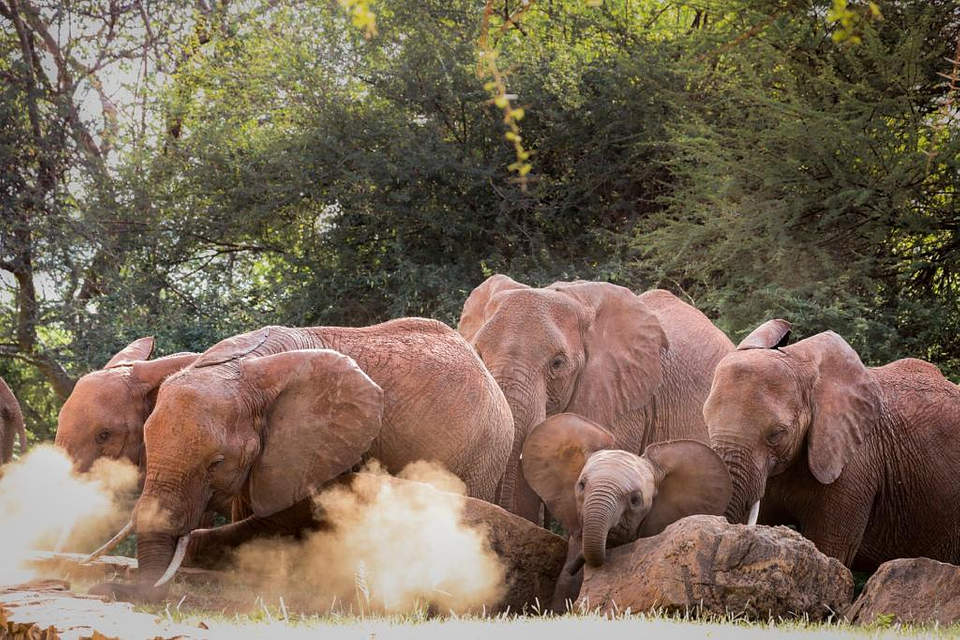
After nearly a year's absence, Eco and Mtitu are much grown, but they are still as happy and spirited as ever
Their return was cause for more than one celebration: When Mweya and Edie left last year, several of our older Voi orphans chose to join them. Kihari, Panda, Naipoki, Nguvu, Mbirikani, and Lentili had become increasingly independent, but the tantalising opportunity to nanny Mwitu and Eco was the push they needed to fully transition to the wild. These moments are always bittersweet, but mostly just sweet, as we know our orphans are reclaiming the life they were always meant to have. Still, it has been very special for the Voi team to be reunited with them. To see the orphans they raised since infancy, now thriving as freshly minted wild elephants, is a crowning achievement. These girls clearly had a splendid inaugural year out and about in Tsavo, supported every step of the way by Mweya and Edie. They all seem to have a newfound swagger, not unlike older children coming home for the holidays.
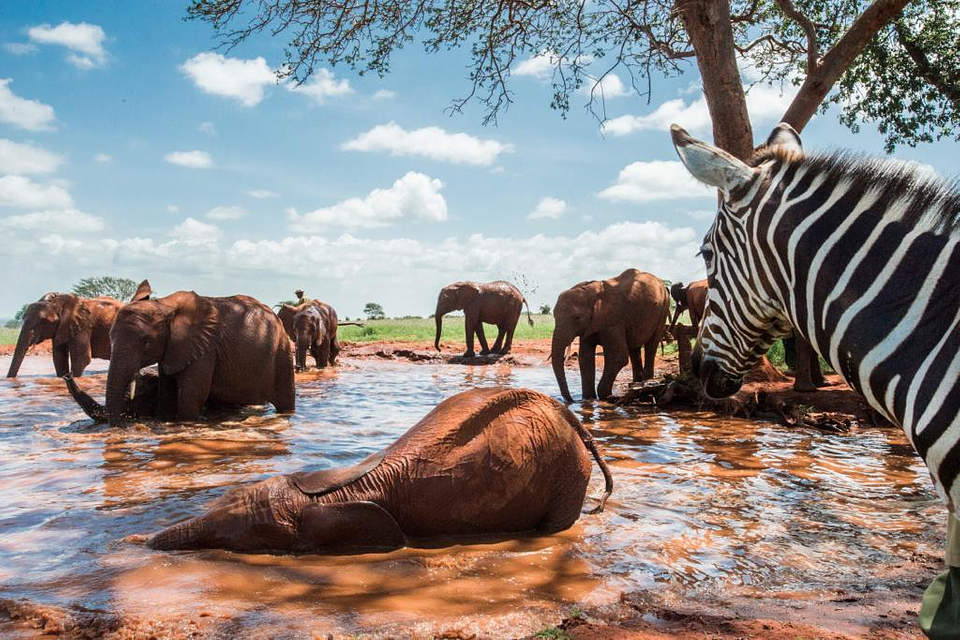
Between the fresh rains and all the homecomings, there is a celebratory mood across our Units this year
The celebrations are also in full swing over in Ithumba. One particular afternoon earlier this month, I felt particularly enchanted by it all. It was one of those shot-in-the-arm moments, when the elephants bestowed so much magic that I just had to pinch myself — and I live this every day! Nothing monumental happened, but each second was positively glimmering. Even the most ordinary occurrences take on a special sheen this time of year.
When the orphans arrived at the mud bath on this particular day, they were preceded only by the Egyptian geese, wooly-necked storks, and herons who had already staked their claim in the water. Still, we could tell something was afoot. The orphans were positively brimming with excitement, splashing around and chasing anything in their line of sight. In fact, the herons proved most willing playmates: When the elephants would charge at them, the regal birds would take flight and then circle back, goading them to try again. It was the orphans who got tuckered out by this game, resting atop the dust piles as if entreating their feathered foes to give them a rest.
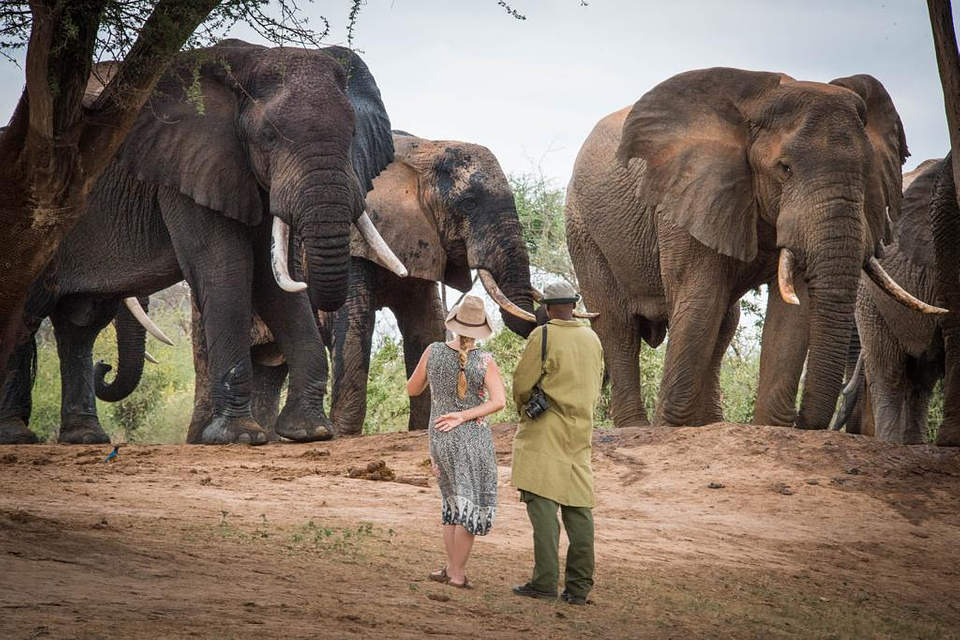
One recent day at Ithumba was so magical that I could hardly believe all that unfolded
All of the sudden, we heard a rustle from the bush and a line of elephants emerged, led by a particularly stately female. Ithumba Head Keeper Benjamin exclaimed, “That’s Galana!” As a fully reintegrated member of Tsavo’s wild elephant population, we hadn’t seen her since early in the year, so this was a happy reunion indeed. Galana was flanked by her four-year-old daughter, Gawa, who is turning into a stately elephant in her own right. Next in line was Sunyei, who graduated to Ithumba with Galana in 2005 and is also now living wild, with her daughter, three-year old Siku, in tow. Rounding out the group was 21-year-old Yatta, who is a mother of two. Her firstborn, Yetu, is no longer a baby; she will turn nine in January and towers over our dependent orphan herd. Yoyo, Yatta’s youngest, was born within weeks of Siku and still has lots of growing up to do.
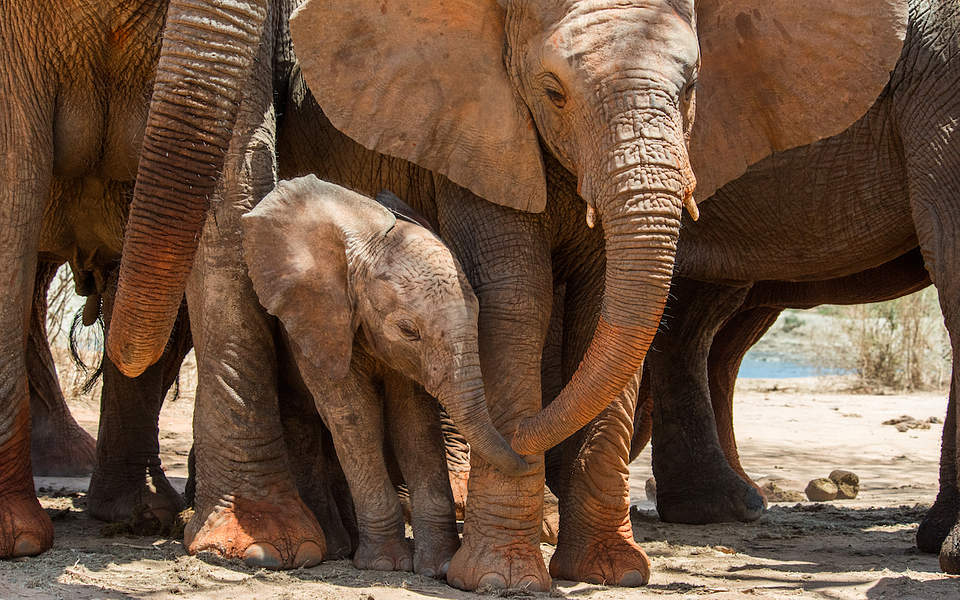
When our wild-living orphans visit with their babies in tow, our dependent herd is over-the-moon excited
Again, their presence alone is a present, but some special details tied up the scene with a big, proverbial bow. Yatta was also taking care of a calf named Mwende who belongs not to her, but to her best friend, Mulika. Yatta and Mulika were rescued less than a year apart, at the turn of the millennium. They grew up in our care together, first at Voi and then at Ithumba, and when they were ready to transition to the wild, they did so in each other’s company. We know Mulika is in the area, but on this particular day, she was nowhere to be seen. Whatever the reason for her absence, Yatta recognised that her best friend needed some babysitting coverage and happily volunteered to watch her daughter. These moments remind me just how strong the bonds are between our orphans. They are more than friends, they are truly family, bound by a shared past and a pure love for one another.
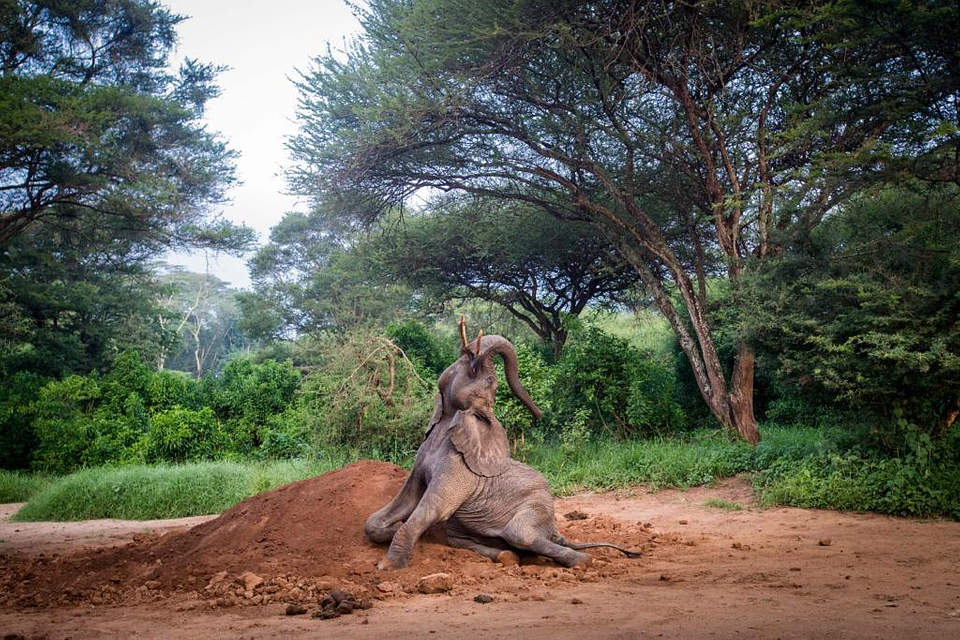
If the elephants fling their trunk a hundred times to express their happiness, that's not enough
These bonds also extend to us, and we are privileged to be included in our orphans’ lives, even after they have transitioned from our care. On this particular day, we were standing in the midst of 41 elephants — three generations, dependent orphans and wild-living orphans with babies of their own. Their happiness was so tangible; if they brandished their trunks in joy a hundred times, it wasn’t enough. This is their holiday, after all: After navigating a challenging dry season, the rains delivered and living is easy. All our wild-living orphans’ babies walked past us without a care in the world, treating us almost as if we were any other bystanding elephant. We cherish this trust, which has been earned and passed down through generations. While these calves have only known a wild existence, their mothers and nannies have clearly communicated that we are to be considered extended family.
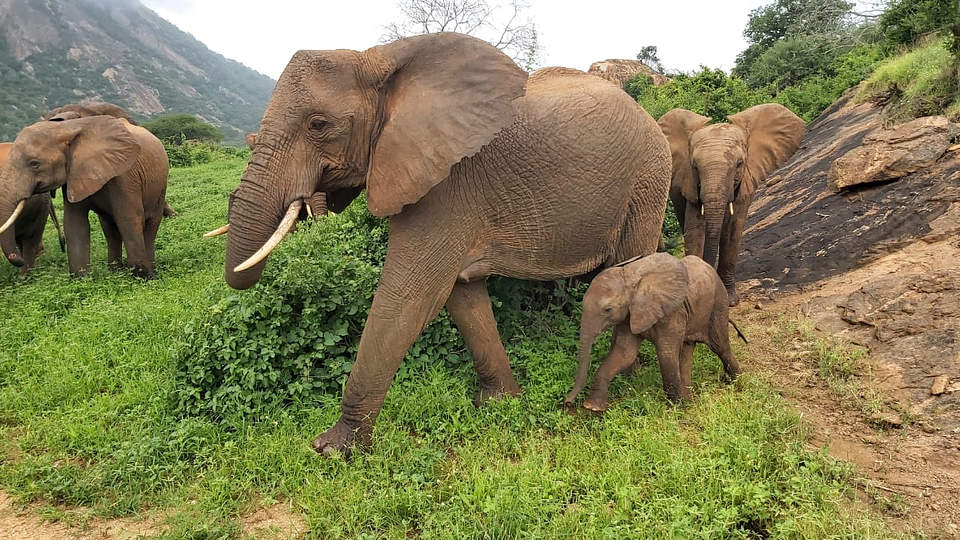
On the 18th of this month, Chyulu introduced us to her brand new baby, who we have named Cheka
Happily, our family is ever-growing. Both Yatta and Galana are heavily pregnant, and we hope to see the pitter patter of tiny feet soon. We are on the verge of a real baby boom across our reintegration units, with many of our wild-living females just approaching the age of motherhood and many more ready to have their second, third, or even fourth calves. In fact, just days after I witnessed this special scene, we met our 38th calf born to one of our orphans: On 18th December, Chyulu proudly strode up to Ithumba to introduce us to her perfect baby boy. Befitting the jubilant mood that prevails at Ithumba right now, we named her baby Cheka, which is the Swahili word for laugh.

We are blessed to be part of this extended, ever-growing elephant family
In a year marred by misfortune for our own kind, we must cherish the moments that make us smile. These orphans have also known tragedy and separation; the happiness they know today has not always been so. However, elephants are creatures who live determinedly in the here and now — and what a blissful existence that is! And so, while this holiday season has been anything but normal, I take great comfort in the fact that some traditions continue unchanged. Our orphans still come home for the holidays, bearing the greatest gift: the next generation of Kenya’s elephants.
Angela Sheldrick produces Field Notes as a special monthly email, providing her personal insight into varying aspects of Kenya's wildlife and habitats, along with the work of the Sheldrick Wildlife Trust. To be the first to receive future editions of Field Notes, please subscribe here.
